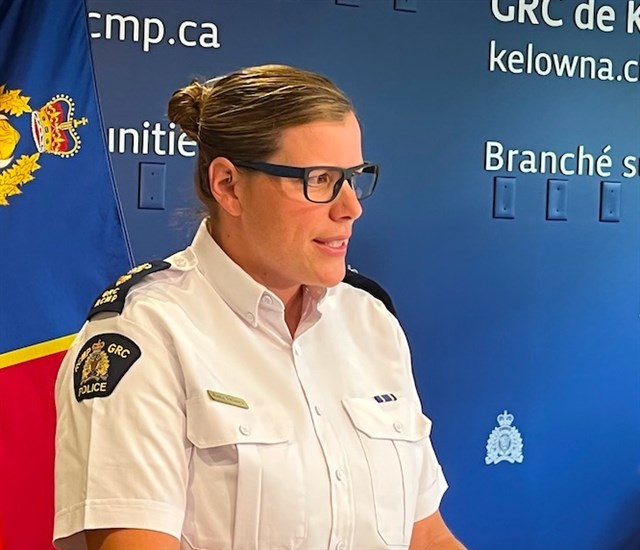
Kelowna RCMP Supt. Kara Triance takes questions from reporters, Wednesday, Aug. 3, 2022.
(ROB MUNRO / iNFOnews.ca)
August 03, 2022 - 2:56 PM
While trying not to downplay the seriousness of new crime statistics that show Kelowna has the highest crime rate in the country, RCMP Supt. Kara Triance has lots of reasons to justify the numbers.
Statistics Canada data released yesterday, Aug. 2, shows Kelowna’s crimes per 100,000 residents is almost double the national number and 48% higher than B.C. as a whole.
READ MORE: Kelowna's crime rate jumps 10% while numbers drop provincewide: Statistics Canada
“Canadian statistics reports are very clear,” Triance said at a news conference today, Aug. 3. “Visitor population is not taken into account when addressing population and reported incidents of crime. For example, Kelowna has 2.2 million visitors every year. Those 2.2 million visitors will generate incidents of crime.”
The data compares the 35 largest cities, called Census Metropolitan Areas, in the country. Kelowna, under that definition, includes the entire Central Okanagan regional district.
Triance pointed out that, since Kelowna is one of the smallest cities on the list, a small change in the number of crimes can have a big impact on what’s called the Crime Severity Index, which measures crime and severity.
In terms of crime rate, Kelowna’s went up 10% in 2021 versus 2020 while the Crime Severity Index only went up 6%. On that scale, Kelowna’s has the second highest crime severity in the country, behind Lethbridge.
Regardless of which measure is used, crime increased in Kelowna while it went down 4% B.C.
When it was pointed out to Triance that there have been tourists coming to Kelowna for decades and that it has always been one of the smallest cities on the list, she had other explanations for the city’s high crime rate, which she said is comparable to Kamloops, Penticton and Vernon.
For one thing, there have been changes in the criminal prosecution system over the last 10 years that require quicker and more detailed processing of files.
There may not be the same level of health and addiction services in the Interior as in the Lower Mainland, she said.
She has also been very focused on correctly filing incident reports so that may contribute to higher numbers versus other cities where, for example, bylaw officers might reply to calls instead of the RCMP so those aren’t entered into the statistical data base.
But when pressed on the fact that all those factors have been there for years and Kelowna is going in the opposite direction from most of the country, she pointed out the area’s rapid growth.
“We are one of the fastest growing cities in Canada,” Triance said. “It is growing at a rate that is beyond that of many other cities that are Census Metropolitan Areas. We know that with growth, we must increase our response, we’re going to see an increase in instances reported to the police, we’re going to see instances increase due to growth factors.”
READ MORE: Kelowna, Kamloops among three fastest-growing larger cities in Canada, new census data shows
She went on to say the proactive work her officers are doing, such as a three-member child sexual imagery team and nabbing prolific offenders, also contributes to more files.
Triance was asked, given the growth, are there enough police officers in the region?
All member municipalities have increased their policing numbers this year but there have been problems recruiting because of the high housing costs in the region, she said.
While officers from other regions want to come to Kelowna, she has only been able to recruit from those who own houses in other communities so they can afford to relocate.
There have been 29 “resources” added this year and none lost. She would not say how many vacant positions there are in the regional force.
While these are all reasons she gave to explain why the crime rate and severity index have increased, that doesn’t mean it’s not troubling.
“I am not here to tell you that we don’t have a problem that needs to be responded to,” Triance said.
“I’m here to tell you that these very concerning statistics are the ones that we are actively acting on. I’m here to tell you that we will continue to provide that policing service for our community in a dedicated and focused approach to make sure we are addressing these issues."
To contact a reporter for this story, email Rob Munro or call 250-808-0143 or email the editor. You can also submit photos, videos or news tips to the newsroom and be entered to win a monthly prize draw.
We welcome your comments and opinions on our stories but play nice. We won't censor or delete comments unless they contain off-topic statements or links, unnecessary vulgarity, false facts, spam or obviously fake profiles. If you have any concerns about what you see in comments, email the editor in the link above.
News from © iNFOnews, 2022